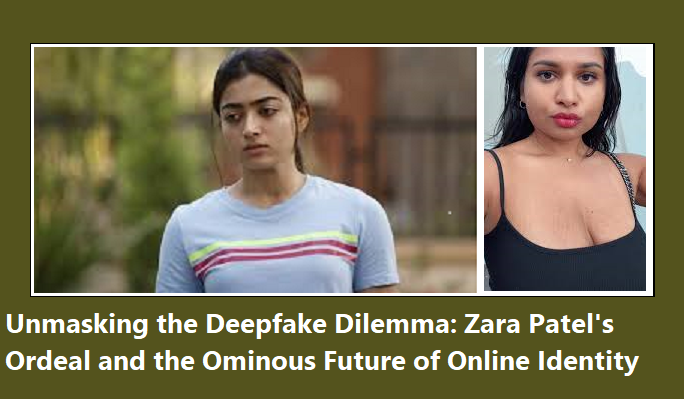Deepfake Controversy:
In the age of digital transformation, the world has witnessed numerous advancements in technology that have fundamentally changed the way we communicate, interact, and share our lives on social media. However, this progress comes with a dark side—deepfake videos that can manipulate and fabricate content to deceive and exploit individuals. The recent controversy surrounding a deepfake video involving British Indian influencer Zara Patel and Bollywood actress Rashmika

Mandanna highlights the alarming consequences of this technology. Zara Patel, the unsuspecting victim, has come forward to denounce her involvement and express her concerns about the potential ramifications for women and girls on social media.
Zara Patel’s Disturbing Encounter
Zara Patel, a data engineer by profession and a mental health advocate, is an influencer with 4.5 lakh followers on social media.
She recently became embroiled in a deepfake controversy when her image was manipulated to create a video of Rashmika Mandanna.

Zara’s Response
Zara Patel vehemently denied any involvement in the deepfake video.
She expressed her distress over the incident and the potential consequences for women and girls on social media.
Zara’s plea for vigilance: “Not everything seen on the internet is real.”
The Harrowing Impact
- Zara’s ordeal serves as a grim reminder of the power and danger of deepfake technology.
- Rashmika Mandanna’s reaction and her call for immediate action to combat identity tampering.
The Menace of Deepfake Technology
Deepfake technology has advanced significantly in recent years, making it easier to manipulate videos and images.
The use of deepfake technology to create deceptive videos and manipulate content has indeed become a concerning issue in the era of advanced AI. The incident involving actor Rashmika Mandanna is a stark example of how deepfake technology can be misused for various purposes, including disinformation, misinformation, and potentially damaging the reputation of individuals.
Deepfakes are created using AI algorithms and machine learning techniques, which can convincingly alter the appearance and behavior of people in videos, making it difficult for the average viewer to discern the authenticity of the content. This poses significant challenges for both individuals and society as a whole. The proliferation of deepfakes poses a grave threat to individuals, their reputations, and their privacy.

The Victims:
Numerous celebrities and public figures have fallen prey to deepfake videos, leading to unwarranted embarrassment and damage to their image.
The case of Zara Patel and Rashmika Mandanna underscores the urgency of addressing the issue.
Zara Patel’s Online Persona
A Dual Life
Zara Patel is a data engineer by day and a social media influencer by night.
Her advocacy for mental health and openness on bold content sets her apart.

The Incident
Zara Patel’s video in a black short dress became fodder for anti-social elements to create a deepfake video involving Rashmika Mandanna.
The Looming Threat to Women and Girls
The Fear of Exposure
Zara’s worries for the future of women and girls on social media. The potential consequences of women shying away from sharing their photos and videos online. Millennium Superstar of Bollywood Mr Amitabh Bachchan expressed concern over the incident.
The concerns raised by Abhishek Kumar and actor Amitabh Bachchan highlight the need for legal and regulatory measures to address the spread of fake content on the internet. Such measures may include stricter regulations on the creation and dissemination of deepfake content, as well as ways to hold individuals or organizations accountable for creating and sharing deceptive videos. Developing methods to detect and authenticate content, as well as raising awareness about the existence and potential dangers of deepfakes, are also important steps in combating this issue.

It’s worth noting that while some countries have started to introduce laws and regulations related to deepfake technology, addressing this challenge on a global scale remains a complex task, as the internet operates across borders, and the technology is constantly evolving.
In the case you described, it is essential to investigate and identify the creators of the deepfake video to understand their motivations and potentially take legal action against them, if necessary. Additionally, users should exercise caution and skepticism when encountering online content, especially when it involves sensitive or controversial subjects, to avoid falling victim to deception.
A Call for Awareness
- Zara Patel’s appeal to fact-check before believing everything on the internet.
- The responsibility of society in raising its voice against identity tampering and deepfake manipulation.
Conclusion
In an era where technology blurs the lines between reality and deception, the deepfake controversy involving Zara Patel and Rashmika Mandanna serves as a stark reminder of the potential threats posed by these manipulative videos. Zara Patel’s distress over her unwitting involvement in the controversy and her concerns about the impact on women and girls on social media cannot be ignored. It is high time for society to collectively raise its voice against the malicious misuse of technology that undermines online identity and exploits individuals.
Image Courtesy: Google
For more related news – https://universenews.co.in/category/news/
